#Filmmaking Lessons
Explore tagged Tumblr posts
Photo

(Watch the video interview on Youtube here)
6 Lessons To Help First Time Filmmakers by Jamison LoCascio and Adam Ambrosio via FilmCourage.com
Jamison LoCascio: My name is Jamison LoCascio. I’m a feature film director, writer and producer.
Adam Ambrosio: Hi. My name is Adam Ambrosio. I’m a producer and one of the writers of SUNSET.

The things that Film Courage asked us to do today was come on to talk about 6 Things We Learned While Making Our First Feature Film THE DEPTHS (that we applied to our second feature film SUNSET).
1. Trust Your Passion.
Definitely one of the first things I would say is to trust your passion and to choose your advisors carefully. The people that come on and help you with the film. You have to trust these people, they’ll give you a lot of information and it is definitely...(Watch the video on Youtube here).

More Film Courage videos on our 2nd Youtube channel here...
#dslr#film#filmmaking#filmmakers on tumblr#indie film#dslr filmmaking#filmmaking tips#filmmaking lessons#indie filmmakers#short film#nyc#cinema#horror#horror filmmakers
2 notes
·
View notes
Text

got bored in class and animated part of the. u know the scene
#nandermo#my professor: hey this is about storytelling and filmmaking this lesson is very relevant to your major#me: ok ok but check this out THEYRE FIGHTING#what we do in the shadows#nandor the relentless#guillermo de la Cruz#to be fair all our grades are in for the quarter for this class there’s nothing else to do#2021 art#animation
901 notes
·
View notes
Text

Jabari Brown 2022
#jabari#jabari brown#black love#black positivity#black women#melanin#black men smile#streerart#love black women#black marriage#black family#black filmmaker#melanin love#minimal streetphoto#minimalistsource#minimaltattoo#life lessons
16 notes
·
View notes
Link
Check out my thoughts after using the Aputure 2x Fresnel for many months! This light modifier is VERY powerful and helps make even cheaper LED lamps reach beyond their standard range, all for a reasonable price!
Subscribe on YouTube! https://youtube.com/@TrentonHoshikoCinematography
#filmmaking#filmmakingtutorial#cinematography#video production#IndieFilm#filmmaking indiefilm cinematography cinema DIYFilmmaking#diyfilmmaking#micro budget filmmaking#cinematography lesson#nofilmschool
2 notes
·
View notes
Photo










SUBLIME CINEMA #144 - HERZOG’S LESSONS OF DARKNESS
One of the greatest documentaries of all time is also one of the strangest. Herzog doesn’t even attempt to rationalize these otherworldly images of Kuwaiti oil fields set ablaze, a document of ‘cataclysmic strangeness’. He gives us a detached, alien perspective onto the catastrophe, set largely to music and lacking ordinary interviews or commentary, and lets the fire speak for itself. There is something truly awesome about it, however terrifying.
#cinema#documentary#herzog#werner herzog#lessons of darkness#kuwait#gulf war#film stills#16mm#16mm film#doc#oil#cinematography#film#filmmaking#middle east#catastrophe#movie#cinephile#aesthetic#fire#flames#burning#apocalypse#apocalyptic world
109 notes
·
View notes
Text


Kira Bursky, {2020} Lessons From My Nightmares
#film#gif#kira bursky#lessons from my nightmares#2020#female filmmakers#short film#machine learning#gan#2020s#usa#colour#animation#latent space walk#walking#people#women
14 notes
·
View notes
Text
5 Non-Filmmaking Books Every Documentary Filmmaker Should Read
Your bookshelf might be fully stocked with filmmaking how-to books but I think the most powerful books a filmmaker can read aren’t related to filmmaking at all. In order to be an effective documentary storyteller, you need to have insight into how people think and what motivates them to do the things that they do.
An understanding of human behavior will help you conduct interviews, research, and explore the narrative. Here are 5 books that’ll make you a better journalist and filmmaker.
1. “Merchants of Doubt”, Erik M. Conway & Naomi Oreskes
We live in a world that’s orchestrated by spin; where PR professionals are ring leaders of the spectacle and we’re both the audience and the main attraction. Merchants of Doubt explores the idea that we live in a post-truth world, meaning that people are, in fact, entitled to their own facts. It proves that a side doesn’t need to prove that they’re right— they just need to inject enough doubt to make the audience believe that there’s still a debate to be had.
The book begins with the political and public relations machines that manipulated the American public’s consciousness for decades in regards to the potential for tobacco to cause cancer and continues to explore how systems played the same script with acid rain and climate change, among others.
Miseducation campaigns only promise to grow in size and scope, making this a timeless and timely read. Don’t be surprised if you find yourself highlighting the majority of every page.
2. “Predictably Irrational”, Dan Ariely
A hot political talking point is about our need to have a “rational debate”; one that favors facts over feelings and statistics over heart-warming gibberish. But is the line separating the two that easy to draw or even easy to see?
To enter into a scenario with the assumption that humans will naturally shy away from emotions can produce potentially disturbing and disrupting consequences because it ignores the real fact: at their core, humans are emotional beings, incapable of ignoring an irrational urge even when faced with a much smarter solution.
We do ourselves a disservice by ignoring this certainty but also insult the beautiful humanity in our choices. Predictably Irrational is an engaging, quintessential read to gain a better understanding of our irrational tendencies that are, in fact, completely predictable.
3. “Drive”, Daniel H. Pink
Carrots and sticks: it’s supposedly the force that guides what we do and even influences who we become but what really motivates us? What pushes us to work, to create, to pursue? How do we influence others to do the same? The answer isn’t what you might think.
There’s a mismatch, a culture clash, between what science says and what business believes, and bridging the divide is how we can grow as a society and enrich the world. Understanding motivation is a critical issue in crafting a narrative in stories. What pushes your character towards their goal? That’s where your story lies.
4. “40 Psychology Studies That Changed The World”, Roger Hock
The Stanford Prison Experiment. Stanley Milgram. Being sane in insane places. These might be events, people, or concepts you know but what do you really know about them? The title isn’t hyperbolic: these studies really did change the world and this book highlights the beautiful and the macabre findings and all the triumphs and the shortcomings of our humanity that have been discovered.
The stories that are explored here can give you insight into your subject matter, the people involved, or perhaps will motivate you to explore the study itself. The subjects are cumbersome but the writing is accessible and although the chapters are technically snapshots, they’re never lacking in substance.
I’ll admit, this particular choice is incredibly biased—and yes, I know the whole list is but this one, specifically, is—this book is one of my favorites, and I don’t just mean for this list.
5. “Dealing With An Angry Public”, Lawrence Susskind & Patrick Field
Every industry has a plethora of skeletons in its closet; secrets buried deep that must remain hidden in order for power players to not only survive, but thrive. What happens when sunlight is let in and nerves are exposed? How do you handle the backlash and the inevitable fallout?
This book is based on the infamous MIT-Harvard “Angry Public” seminars. It’s even been used as part of the marketing strategy for certain natural gas companies (as explored in Gasland 2). I’ve read reviews of this book in which readers seem outraged by the authors interpretations and proposed manipulative behavior but I don’t think that’s an effective interpretation nor is it accurate.
It’s actually a powerful tool if you’re trying to understand the marketing and public relations strategies that are typically employed by corporations in the aftermath of a scandal. It’s, in fact, a playbook of sorts; and in that regard, it provides remarkably valuable insight into the maneuvers and skills that are necessary for a business to survive a reckoning.
I hope these book suggestions help you in crafting your next masterpiece 😉 Let me know what adventure they lead you too 🤘
#film#filmmaking#writers#writing#filmmaker#books#nonfiction#documentary#global warming#book related#documentary film#learning#lessons learned#rebelwithalens#rebelwithalensblogposts
3 notes
·
View notes
Photo

via IG@cinema_of_tarkovsky Andrei Tarkovsky: “Never try to convey your idea to the audience–it is a thankless and senseless task. Show them life, and they’ll find within themselves the means to assess and appreciate it.” (From Sculpting in Time: Reflections on the Cinema, page 152 - Another quote from Sculpting in Time I wanted to share with everyone with this photograph of Tarkovsky with his father)
1 note
·
View note
Photo
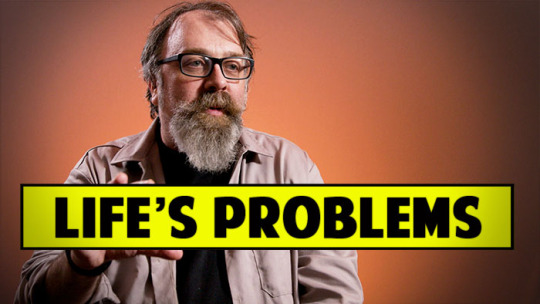
Life Is Easier When I Am Writing - Tony DuShane via FilmCourage.com.

#life lessons#film#artists#creators#filmmakers#authors#artists of tumblr#authors on tumblr#being creative#Tumblr artists#tumblr writing society#writing community#hollywood#independent film#lliterary
5 notes
·
View notes
Text
What are the top-five lessons and/or memorable moments for you from 2019?
This last Saturday of 2019 - Here is two of five for me...
A memorable moment for 2019 that will stand strong is being involved with not one but two film premieres. Not only was I apart of the crew but was entrusted as the Key Makeup Artist. Both of the films were shorts that told a story so it was easy to jump on board in that sense.
Another thing that made it so great was both films were directed by the same young lady who is very quickly pushing boundaries with her style and allowing her authentic voice to be heard within the industry. Thank you Malakai Creative for asking me to be on your team!
Being a part of both of these projects pushed me. One I was pushed because being a part of a film is different than being a part of an event, photoshoot or commercial. The days are long, you have to pay attention to script updates and stay alert for changes that may be happening that would cause issues with continuity. Secondly, I was pushed in my professionalism as it was tested. Some times talent thinks they know better than you! In that, you have to remember why you were asked to be a part, support the director and remember your role is just as vital as the next person. I am thankful for the push because each has made me better!
I am grateful for being able to work with incredible talents from novice to vet's that were a part of each of these awesome films.
I am definitely looking forward to more film/tv gigs in 2020!!
#memorable#2019/20#life lesson#memories#know your worth#know yourself#knowyourhistory#makeup tumblr#makeup artist#short film#film#filmmaker
1 note
·
View note
Text
Wednesday 24th July
Lesson on interviewing today. It’s pretty timely because I’m about to enter into a series of interviews to be released with me in them (eek!) over the next couple of weeks.
I like to think I’m a pretty good interviewer, but there’s some really helpful points I’ve learned today to keep my in the right direction.
Also had to look at who I should interview for this Ethics of Memory project. We’ve just had a major flashbulb moment in the UK as Boris has been elected prime minister (fuck...) so now’s a good time do interview people about where they were, and how they found out, then revisit in a few weeks.
#story#storytelling#study#studyblr#study blog#todays lesson#boris#bojo#ethics#uk politics#memory ethics#film#filmmaker#filmmaking
6 notes
·
View notes
Text
John Carpenter's The Thing offers many lessons in filmmaking. For example:
Have an actor wear a giant cowboy hat
Put a Fucking Thing in there
38K notes
·
View notes
Photo

WATCH HERE: https://youtu.be/EmLyfFdvjfY
This Video Covers: 🎥 How and WHY to create lighting diagrams for your indie film and video productions using the FREE software Draw.io. Lighting diagrams will help you have more concise and clear communication with your team about lighting setups. This helps save time and money for micro budget filmmakers.
Get Draw.io here: https://Diagrams.net (Not an affiliate link, just a great tool!)
#cinematography#filmmaking#micro budget filmmaking#lighting#lighting diagram#filmmaking lighting diagram#cinematography lesson
1 note
·
View note
Text
Acting courses in Kolkata provide students with a solid foundation in the art of acting. You'll learn about voice modulation, body language, script analysis, and stagecraft. You'll also have the opportunity to work with experienced instructors who will provide you with feedback and guidance to help you improve your skills. One of the best things about taking an acting course in Kolkata is the opportunity to immerse yourself in the city's thriving cultural scene. You'll have the chance to attend performances and workshops, meet other actors and artists, and make valuable connections that will help you to grow as an actor.
#acting coach#acting courses#acting lessons#acting school#acting institute in kolkata#acting courses in kolkata#professional acting#actors#directing#filmaker#filmmaker#film industry
0 notes
Video
Today's lesson is understanding how to capture great sound with teamwork, organization and talent. #teamwork #storytelling #branding #motivation #marketing #lessons #sound #teambuilding #filmmaking #fokusfirm #teaching (at FOKUS FIRM) https://www.instagram.com/p/Bp9u5hqBFfI/?utm_source=ig_tumblr_share&igshid=1i3nuwmroyhn4
#teamwork#storytelling#branding#motivation#marketing#lessons#sound#teambuilding#filmmaking#fokusfirm#teaching
2 notes
·
View notes
Text
most of this, i sort of agree with even though i absolutely loathe ep 8 with every fiber of my being, and i basically don't hold the sequel trilogy canon.
but i have to disagree with 'luke never saw vader's atrocities! he was protected!' to which i say, who the fuck cares? remember what happened to luke the last time he and his dad squared up?

i'm just saying, the guy was fully aware that this was his son, and blatantly chopped off his hand to prove a point. you literally cannot be more evil than this. just a few minutes earlier, he also froze luke's friend, and kidnapped his other friend. the guy also blew up his sister's planet, which luke ran into the rubble of. i'm pretty sure that there is more that vader has done that i can't think at the moment, but even just a couple of these actions individually would be enough to convince anyone that this person was bad news.
i don't mean to be callous, but does finding out or seeing that his dad-notorious mass murderer- surprise, killed a bunch of other people really change much? it was probably filed away under more people for whom my dad made life a nightmare box in his brain. luke not knowing exactly what kind of person his dad was takes away from his staunch belief that he could be redeemed, and paints him as more naive rather than compassionate.
other than that, i do agree with most of what this essay posits-especially the fact that the dark side is a constant battle, and not a big decision. it's small, but it really emphasizes how good choices have to keep being made, and that bad choices do not cancel out your good choices. your bad choices will yield bad consequences, and your good choices yield good outcomes. it's very hindu in a way.
however, i don't know where the idea that obi-wan wanted to redeem vader came from, because he did not. it was kind of an important plot point that obi-wan didn't believe that vader could be redeemed, and nowhere in the OT or PT does it state implicitly or explicitly that he believed Anakin to be redeemable- it was so bad that he literally disassociated the two because he couldn't reconcile them together. no one but luke believed that vader could be redeemed, which is why it is so satisfying that luke is proven right, and vader chucks palpatine down the elevator shaft.
Luke Skywalker in 'The Last Jedi' (1/2)
Luke in The Last Jedi... love it or hate it, it's a difficult subject.
I personally stand somewhere in the middle. I don't think Luke was "ruined"... I'd argue that, from a purely in-universe perspective, his subplot actually tracks with what was previously established in the original films.
There are issues, but I think they are mainly found on an out-of-universe/structural level (which I'll get into in post 2/2). For now, let's take a deep dive and unpack why this portrayal isn't all that problematic.

The most commonly-heard argument is that:
"They ruined Luke's character! He would never go into exile or abandon his sister and friends!"

Simply put, Luke used to be:
an optimist
so brave he'd risk his life to save his friends,
aspired to become a Jedi.
Whereas, in The Last Jedi, he's:
jaded and depressed,
hides/abandons his sister and friends, like a coward,
says the Jedi need to die?!
Now the fact is... Luke is 24 years older when he goes into exile, 30 years older in The Last Jedi. People change, with age.
In Luke's case, he matured from an impatient kid who'd rashly run to save his friends, like in Empire Strikes Back, to a grown-up who makes hard choices and restrains himself from doing that, even though he desperately wants to.
Luke tells himself this is a self-sacrifice this for the greater good.
"Because he’s the last Jedi and a symbol of that it then becomes this self-sacrifice, he has take himself out of it, when he knows his friends are dying, when the thing he’d most like to do is get back in the fight." - Rian Johnson, The Empire Film Podcast, 2018
And Rian Johnson didn't want Luke to come across as a coward, so he also gave Luke an argument that initially seems to make sense:

The Jedi way is flawed and inevitably leads to arrogance. Proof: the Sith originally came from Jedi. His own new order is no exception to that rule, even if he thought it was (in his arrogance, he believed his own legend).
So if he leaves and stays in exile? No more Jedi, no more Jedi-turned-darksiders that can mess up the galaxy.
The Force will keep trying to balance itself and a new, worthier source will appear (in the form of Rey).
But while his reasoning that "the Jedi are inevitably arrogant" seems sound and reasonable... it's wrong.
Just like Dooku's reasoning that "the Jedi are corrupt" seems sound, but is ultimately wrong.
Just like Anakin's rationalization that "the Jedi are evil" seems sound nope, that one doesn't even seem sound, it's just plain wrong.
Where is it wrong, in Luke's case?
Well, he's rationalizing his actions by blaming the Jedi religion, instead of admitting his own failure.
"The notion of, 'Nope, toss this all away and find something new,' is not really a valid choice, I think. Ultimately, Luke's exile and his justifications for it are all covering over his guilt over Kylo." - Rian Johnson, The Art of The Last Jedi, 2017
"In his own way, [Luke is] trying to disconnect, he’s trying to throw away the past, he’s saying 'Let’s kill [the Jedi] religion. It’s the thing that’s messing us up, thing thing right here, let’s kill it.’ And the truth is, it’s a personal failure. It’s not religion, it’s his own human nature that’s betrayed him." - Rian Johnson, The Empire Film Podcast, 2018
He fucked up, plain and simple.
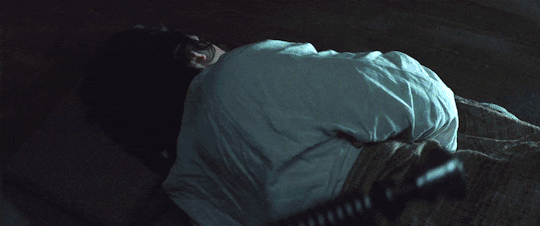
But it's not because “he’s a Jedi and that made him arrogant and the Jedi mentality is flawed”, as he claims early on in the movie.
He failed because he's flawed. Luke is human and had a moment of weakness where he was scared shitless and acted on instinct.
Yoda's spirit helps him realize this, and he fixes his mistake by allowing Leia and the resistance to save themselves. And as he does it, he acknowledges the importance of the Jedi and their teachings.

And it's also why, in The Rise of Skywalker, he has the maturity to admit that he wasn't staying on the island out of some self-sacrificial gesture, as he kept telling himself. Truth is, he was afraid. Afraid he'd screw up again.

Do the movies go about this in an emotionally-satisfying way? That's debatable. But, on paper, I don't think Luke's behavior in The Last Jedi is too much of a shark-jump considering how
THE ORIGINAL IDEA CAME FROM GEORGE LUCAS!
In the couple of months after the Disney sale, Lucas developed the Sequels with Michael Arndt in late 2012/early 2013, and concept art was made by artists like Christian Alzmann.
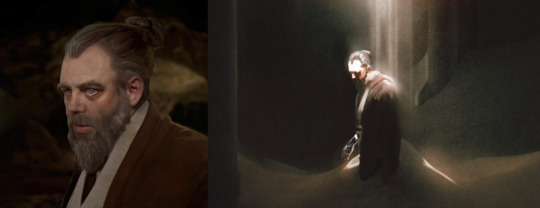
Note: the image on the left got a “Fabouloso” stamp of approval from Lucas!
Lucas’ sequels would feature a Luke Skywalker who was a figure like the jaded, reclusive Colonel Kurtz in the movie Apocalypse Now (which, fun fact, Lucas helped write and was originally set to direct).
The reason why Luke was in self-imposed exile wasn’t specified, all we know is that he was:
hiding from the world in a cave,
haunted by the betrayal of one of his students,
and spiritually in a dark place.
Other concept artists, like James Clyne, tried to illustrate the First Jedi Temple and some of the designs were approved by Lucas, such as the one below.

Eventually, Kira the female Jedi-wannabe protagonist (who eventually became Rey) would seek him out so he can train her.

This Luke would be a much more prominent part of Episode VII (instead of only appearing at the end) but still died at the end of Episode VIII.
For sources and more information about George Lucas’ plans for the Sequel Trilogy, read this post.
The only part that wasn't detailed by Lucas were the specifics of why he went into exile. But all in all, this sounds pretty similar to what we got in The Last Jedi.

"Luke would never try to kill Ben!”
I agree. And he didn’t try to kill Ben. He stopped himself.
And this version of the event?
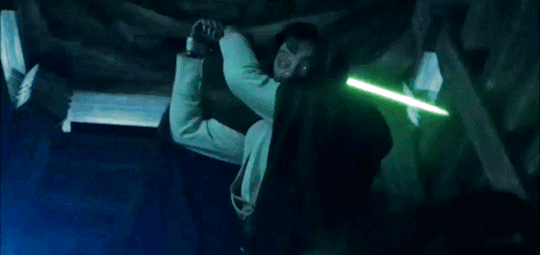
This didn’t happen.
What Kylo tells Rey is his version of the story. And he thinks he’s telling the truth... but his recollection of the event is warped as this was obviously a very traumatic event for him.
"I don't think he's lying actually. In my mind, that was his experience. [...] I think that it's probably twisted a little bit by Kylo's own anger and his own prejudices against Luke, but I feel like he's actually telling her the truth of his experience." - Rian Johnson, Star Wars: The Last Jedi commentary, 2017
The narrative frames the third version of the story as the one that’s objectively how events went down. Because Rey believes him, and Rey is both the protagonist and a stand-in for the audience.
Now, if you think Luke’s word is unreliable and you have an easier time trusting Kylo’s version of the story, go to town.
But I think that if you actually believe would Luke would never try to kill Ben, you’d take Luke's second retelling of the story at face value.
I know I do.

“Okay, but he would never consider killing a child, like Ben. He saw the good in Darth Vader!”
First off, Luke refers to Ben as "a scared boy" because, he's a middle-aged man. But objectively, Ben was 23 years old.
But also, I mean... with Vader, Luke actually had the luxury ignorance.
Do you think would have truly gone on that Second Death Star if he had actually witnessed Vader:
choke his Padmé,
kill Obi-Wan,
actively try to kill Ahsoka,
murder Jedi younglings,
betray and hunt down his other Jedi brothers and sisters,
and cold-bloodedly kill countless innocents, one by one?
There’s a difference between watching him kill Ben Kenobi (who still ‘lived’ as a ghost and talked to him seconds later) and hearing a couple of rebel pilots get blasted in the trench run, and actually seeing all the horrors he’s committed.
Don't get me wrong, Luke knows Vader is evil, absolutely. But if he had seen this side of Vader, the needlessly cruel side...
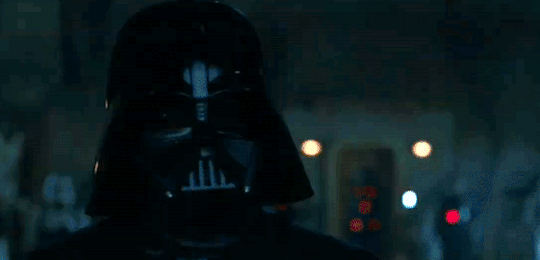
... I'm not sure he'd have been as compassionate.
Proof: Obi-Wan, someone who deeply loved Anakin (to the point where he could never bring himself to kill him), someone that genuinely wishes that Luke can redeem him... also feels that, realistically, attempting to do so would be pointless.
And hell, even without really seeing all the massacres Vader committed, the second the latter threatened his sister, Luke went berserk and almost killed him!
So the question becomes:
“What could make Luke - trained Jedi Master, long-time optimist and overall compassionate to a fault - consider killing Ben?”
All we’re told is that he looked into Ben’s mind and saw darkness and the destruction, pain, death, and the end of everything he loves.
The specifics are left to our imagination. They could include:

the sight of Kylo slaughtering his parents and Chewie with a smile on his blood-smeared face,
the smell of Han's burning flesh in the air,
the wails of Chewbacca as he's run through by Kylo,
the faint sound of Leia's tears hitting the ground,
the destruction of the New Republic's citizens and planets.
Whatever it may have been, it was intense. Because Force-induced visions are vivid as hell, as has been shown throughout the franchise.

It's not like watching something on a TV, you're there, all your senses are affected in an extremely powerful way.
And the vision Luke experienced scared him so much that even shortly after it, when looking at a sleeping young man, all he sees is that evil monster from the vision. So he tremblingly draws his saber.
But it's evident that Luke wasn't thinking clearly or rationally.
His base emotions had taken the wheel, he was being tempted by the Dark Side.
"He doesn’t give in to the Dark Side, it’s a moment of temptation to the Dark Side. It reminds me very much of when Vader is tempting Luke, when Luke is underneath the stairs in [Return of the] Jedi, lit with that very beautiful half-and-half, the duality of these two sides of him being pulled. And that’s really what that moment is for me, it’s a moment of temptation to the Dark Side for Luke." - Rian Johnson, IGN, 2017
And yet despite seeing all that... Luke catches himself.
It's not the first time that Luke almost does something horrible to a family member and catches himself. Again, 24 years prior, he almost murdered his own father in a fit of rage.
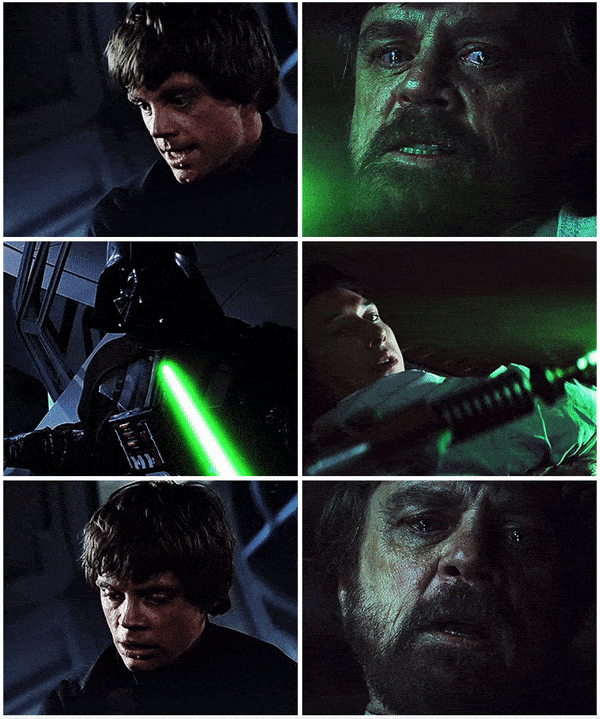
The scene in Ben's hut intentionally parallels that outburst he has in Return of the Jedi.
A terrible future is presented before Luke.
He reacts instinctively, is tempted by the Dark Side.
He snaps out of it.
The only real difference is that, in Return of the Jedi, Luke only comes to his senses after a frenzied onslaught during which he actively tried to kill his own Dad.
24 years later, despite having witnessed that terrible future even more vividly than he did on the Second Death Star, he catches himself merely seconds later. Instead of going on a whole rampage, he stops the moment the lightsaber turns on.
I'd call that "progress".

"But Luke should've learned his lesson and known better than to give in to the Dark Side!"
Resisting the temptation of the Dark Side is by no means a one-and-done thing. It's not a power-up that you get, it's a constant struggle.
"I think it disrespects the character of Luke by treating him not as a true mythic hero overcoming recurring wounds & flaws, but as a video game character who has achieved a binary, permanent power-up." - Rian Johnson, Twitter, 2019
Dave Filoni says so too.
"In the end, it’s about fundamentally becoming selfless, moreso than selfish. It seems so simple, but it’s so hard to do. And when you’re tempted by the dark side, you don’t overcome it once in life and then you’re good. It’s a constant." - Dave Filoni, Rebels Remembered, 2019
Hell, even George Lucas stated something along those lines:
"The Sith practice the dark side and are way out of balance. The Jedi aren’t as much out of balance because they’re the light side of the Force. They still have the bad side of the Force in them, but they keep it in check. It’s always there, so it can always erupt if you let your guard down." - George Lucas, The Star Wars Archives: 1999-2005, 2020
Learning the lesson once doesn't mean you've learned it forever. Especially with the Dark Side, which poses a never-ending battle.
In-universe examples: Anakin learned to let go of his attachments during the “Padawan Lost” arc of TCW.

A year and a half later, he’s butchering kids because he can’t let go of his attachments.
And during wartime, Yoda found himself repressing his darker instincts and ignoring their existence. Thus, when he had to face them, he struggled to acknowledge and control them.
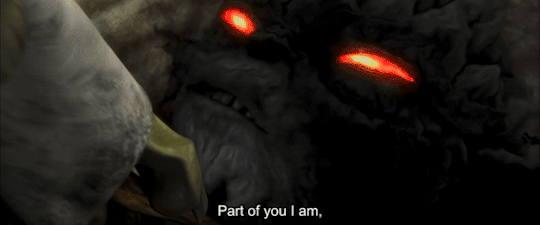
So considering Luke didn't go "rampage mode" with Ben, as he did when he tried to kill Vader, I think he deserves some credit.

Finally, I've heard this insane argument many times, as a response to the above points:
"Yeah but Luke wasn't actually trying to kill Vader! He was holding back, he was trying to keep him alive!"
And, uh... no. He wasn't.
He lost his shit, folks. And almost killed Vader.
Like, right here?
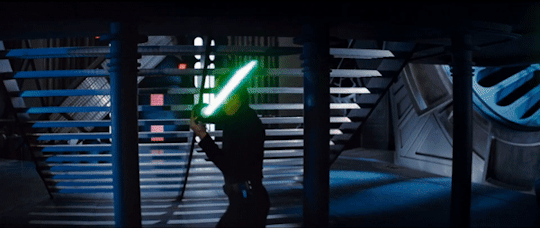
⬆️ If Vader hadn’t moved his saber to intercept Luke’s blade, Luke would’ve stabbed Vader in the face.

⬆️ If Vader hadn’t held his sword up in time, SWISH, there goes the top of his helmet AT LEAST, if not the rest of his head.

⬆️ If Vader hadn’t dodged he’d be chopped in two.

⬆️ If Vader’s arm gave out slightly sooner, if his blade faltered just a little lower, if he loosened his grip on his saber a bit, Vader would be cleaved in two.
My point is that if you swing at someone with a lightsaber? They’ll get chopped. And if you aim for the head or the chest? You’re trying to kill them.
Before Luke got a grip, throughout that whole rampage, the only thing that kept Vader alive was his own skill.
Otherwise, Luke would’ve murdered him in a fit of rage.
If Luke was holding back, then the theme of "resisting the Dark Side" completely falls apart.
There's no indication that he was restraining himself, in he script.

And just look at the imagery.

Luke is surrounded by darkness, symbolizing how he's being seduced by the Dark Side, he's being tempted to give in to his anger towards the man who hurt his friends and took his hand.
Then Vader threatens Leia.
And the next time we see Luke, he's silhouetted, his face is all black.

Luke was originally trying to hold back and talk Vader down, but fails to control his instincts and gives in to fear, to anger, to the Dark Side... and goes all out.
He swings at his father furiously and keeps swinging, until he cuts off Vader's hand... and he is about to deliver the final blow…

… when he sees Vader’s mechanical hand and realizes that by giving in to his anger, that path will inevitably lead him to become exactly like this half-machine half-man laying at his feet. That’s where the path to power leads.
And so he makes a decision:
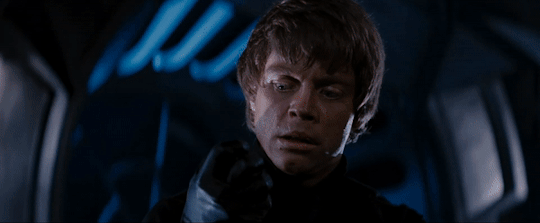
He’s a Jedi. Like his father before him. His compassion for Anakin is stronger than his hate for Vader.
That's the narrative intent.
It has to be.
Because if he had been "holding back" throughout that entire bit, then the stakes are lowered immeasurably, John Williams' saddening score is misplaced, the lightsaber choreography is misleading, etc.

For the above-listed reasons, I think Luke's portrayal in The Last Jedi doesn't really contradict anything in the previously-established lore. It works, it's the typical "old cowboy needs to get back in the saddle" trope. Frankly, I can defend this subject all day long... so where's the problem?
The problem comes in at an out-of-universe level. While it's not inconsistent... it's also not satisfying.
The thing is, if you...
... take one of the most brave and optimistic characters in the franchise, then open the film saying "well, now he's jaded and in hiding", without giving us context on how he became that way...
... take a character whose arc was specifically about controlling his emotions, then show him be ruled by those emotions without providing context for what made him do that...
... then that kills the suspension of disbelief, for a lot of fans.
And, as such, they'll have a much harder time going along with what you're saying.
Because "show, don't tell" is one of the most basic principles in visual storytelling. And we weren't shown:
"Ben being increasingly violent during training",
"Luke sitting Ben down and having a talk with him, only to be ignored" or
"the horrors Luke saw in Ben's head".
I have no doubt that those things happened, in-universe.
But if we're talking about a movie-going experience, many were left emotionally-unsatisfied.
Because all that stuff was in there... but only subtextually. It was up to the fans to imagine on the details. Normally, I'd argue that's what Star Wars is all about: allowing fans to dream and think outside the box. But in this specific case, I think many fans would've rather had a more complete and explicit story. Because it's Luke Skywalker.
And yet... even these structural and writing issues had a logic behind them, and if you ask me... there was no other direction that this story could be taken in.
We'll explore this in more detail in part 2/2.
#star wars#starwars#anakin skywalker#luke skywalker#sw meta#excellent meta#very good points#i just disagree on some areas#mostly i agree#the lesson here is that rian johnson is a horrible star wars filmmaker#tlj critical
259 notes
·
View notes